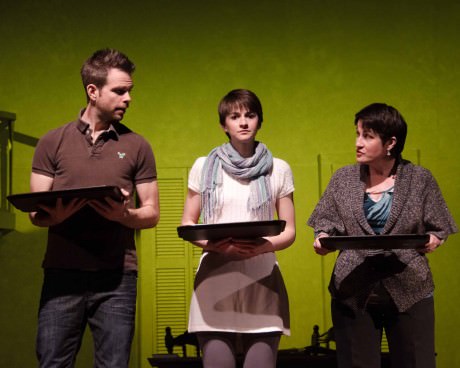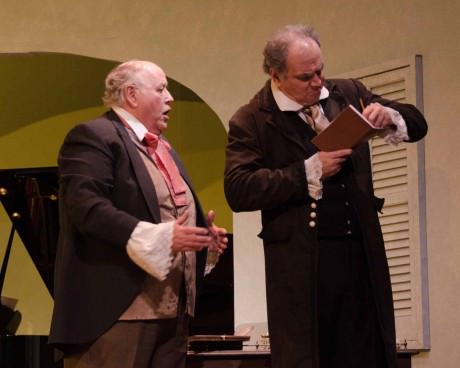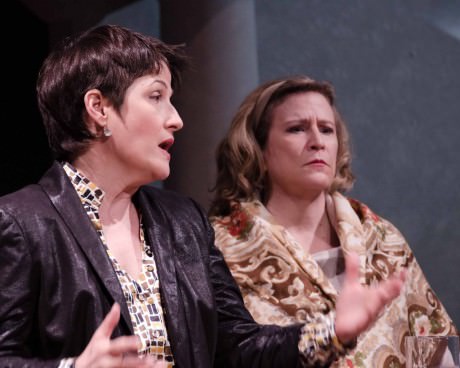There’s an analogy to be drawn between musical composition and the theater. A play is like a theme; each production is a variation on that theme, stretching it past its original bounds and experimenting with the form. A bad production merely mimics the theme. A good production transfigures it. And then there’s a production like 33 Variations at The Little Theatre of Alexandria, which tantalizes audiences by showing how good a variation can be without ever really satisfying us.

33 Variations, by playwright Moisés Kaufman, focuses on the parallel lives of two people separated by hundreds of years of history: the Viennese composer Ludwig von Beethoven (Elliot Bales), and Dr. Katherine Brandt (Sarah Holt), a modern Beethoven scholar. Kaufman is better known as the man behind The Laramie Project, and while 33 Variations doesn’t have the same kind of documentary feel, it does demonstrate Kaufman’s fascination with the human ability to document their own history, and the ways that historical artifacts both are and are not able to accurately tell a story. Brandt is fascinated with Beethoven’s Diabelli Variations, a set of musical variations based on a waltz by the publisher Anton Diabelli (David Rampy). Brandt – herself dying of amyotrophic lateral sclerosis (ALS), better known as Lou Gehrig’s Disease – spends the last months of her life obsessively examining Beethoven’s archived materials to determine why the great composer spent the last years of his life obsessing over what should have been a trifling musical project. The parallels grow stronger when you consider that Brandt is neglecting her difficult relationship with her daughter Clara (Rebecca Phillips) while Beethoven neglects far more important works like his 9th Symphony and the Missa solemnis.
It’s a fertile core to the story, and Director Joanna Henry has taken great pains to draw out the web of connections. As the action jumps back and forth from the 18th to the 21st centuries, talented pianist Matt Jeffrey uses Beethoven’s works to provide both mood music and aural illustrations of the plot. Along with the clever use of projections from Designer Jim Hartz and lighting design by Ken and Patti Crowley, the production does an excellent job of making sure the audience doesn’t get lost in the musical minutae or the sudden scene changes. And some of the staging is electric: Brandt leaning against Beethoven while being x-rayed in the hospital, or a series of overlapped conversations that echo and modify each other.

All of this makes it disappointing that the first act lacks any real impact. In the historical scenes, Bales’s Beethoven eclipses his stiff personal assistant Anton Schindler (Ken Gaul) and the pompous Diabelli. While it may be fitting for the composer to outshine his contemporaries, the other characters seem unable to connect meaningfully with the drama. Their anger doesn’t seem angry, and their concern doesn’t seem concerned. Bales gives them plenty to latch on to, but the others seem as afraid of engaging with him as an actor as their characters are afraid of engaging with Beethoven. All of this does makes Bales’s connection to the music even more powerful. As he listens to the music in his head, we see a Beethoven absolutely transported by the possibilities of the variations – a scene where he appears to direct the on-stage pianist is as powerful as anything else in the production.
If Beethoven is the only emotional character in the historical sequences, the issue is reversed in the present day. Sarah Holt’s Dr. Brandt is an excellent narrator (it’s easy to see why her students are so enraptured with her), but curiously unemotional. While she doesn’t have much warmth for a daughter she sees as flighty and mediocre, her disappointment is strangely toothless. It’s the same disappointment you might feel for a slightly underwhelming meal. Katherine’s triumphs and frustrations over her research are likewise unenthusiastic. This is a stark contrast to the other modern characters.
Melanie Bales is warm and amusing as archivist Dr. Gertrude Ladenberger, and manages to keep the character’s sometimes broad humor from seeming forced. As Katherine’s daughter Clara, Rebecca Phillips functions as the lynchpin of the production. If Holt’s Katherine doesn’t actually seem terribly disappointed, Phillips makes up for it by giving us a visibly hurt Clara. And it’s Clara’s reactions to the other characters – her gratitude, her wariness, her jealousy, her love – that provide a solidity to what could be an otherwise abstract exercise in the first half of the play.
But the real revelation of the evening is Matt Baughman as Mike, originally Dr. Brandt’s nurse and later Clara’s boyfriend. Baughman is effortless in presenting Mike as an affectionate, caring, goofball, and you find yourself simultaneously thinking “No one has ever made that face in the history of dating” and “That is exactly how Mike would act.” It’s no shock that Baughman received the first spontaneous applause of the evening.

What is a shock is the way that 33 Variations seems to spring back to life in the second act. Once Clara joins her mother in Germany and the emotional stakes are raised, the entire cast turns electric. Connections are made. Feelings are felt. Bodily decay leads to emotional intensity. Holt in particular transitions from pedestrian to astonishing; if the first half of 33 Variations features Clara upstaging her mother, Dr. Brandt firmly regains the reins after the intermission. The decision to hold back Holt’s energy for the more difficult and emotional moments of the second act contributed to the sluggish pacing of the first. It makes the production feel uneven, though, especially considering the length of the first section. There’s a variation to be found here where the cast maintains that emotional intensity throughout the evening. What we have instead is like Diabelli’s original waltz: enjoyable for its own sake, but brimming with untapped potential.
Running Time: Two hours and 15 minutes, with one 15-minute intermission.
33 Variations plays through May 18, 2013 at The Little Theatre of Alexandria – 600 Wolfe Street, in Alexandria, VA. For tickets, call the box office at (703) 683-0496, or purchase them online.
LINK
Listen to Diabelli Variations:
33 Variations on a Waltz by Anton Diabelli, Op. 120 (1819-23)
[33 Veränderungen über einen Walzer von Diabelli, Opus 120]
Composer: Ludwig van Beethoven (1770-1827)
Pianist: Grigory Sokolov
Tema: Vivace [0:10]
Variation 1: Alla marcia maestoso [1:10]
Variation 2: Poco allegro [3:38]
Variation 3: L’istesso tempo [4:33]
Variation 4: Un poco più vivace [6:26]
Variation 5: Allegro vivace [7:52]
Variation 6: Allegro ma non troppo e serioso [9:07]
Variation 7: Un poco più allegro [10:51]
Variation 8: Poco vivace [11:58]
Variation 9: Allegro pesante e risoluto [13:40]
Variation 10: Presto [16:00]
Variation 11: Allegretto [16:32]
Variation 12: Un poco più moto [17:52]
Variation 13: Vivace [18:41]
Variation 14: Grave e maestoso [19:54]
Variation 15: Presto scherzando [24:24]
Variation 16: Allegro [25:02]
Variation 17 [26:02]
Variation 18: Poco moderato [26:59]
Variation 19: Presto [28:58]
Variation 20: Andante [29:45]
Variation 21: Allegro con brio [32:24]
Variation 22: Allegro molto alla “Notte e giorno faticar” di Mozart [33:46]
Variation 23: Allegro assai [34:31]
Variation 24: Fughetta. Andante [35:28]
Variation 25: Allegro [38:37]
Variation 26 [39:38]
Variation 27: Vivace [40:51]
Variation 28: Allegro [41:48]
Variation 29: Adagio ma non troppo [42:42]
Variation 30: Andante, sempre cantabile [43:57]
Variation 31: Largo, molto espressivo [46:01]
Variation 32: Fuga. Allegro [51:42]
Variation 33: Tempo di Minuetto moderato (aber nicht schleppend) [55:17]





